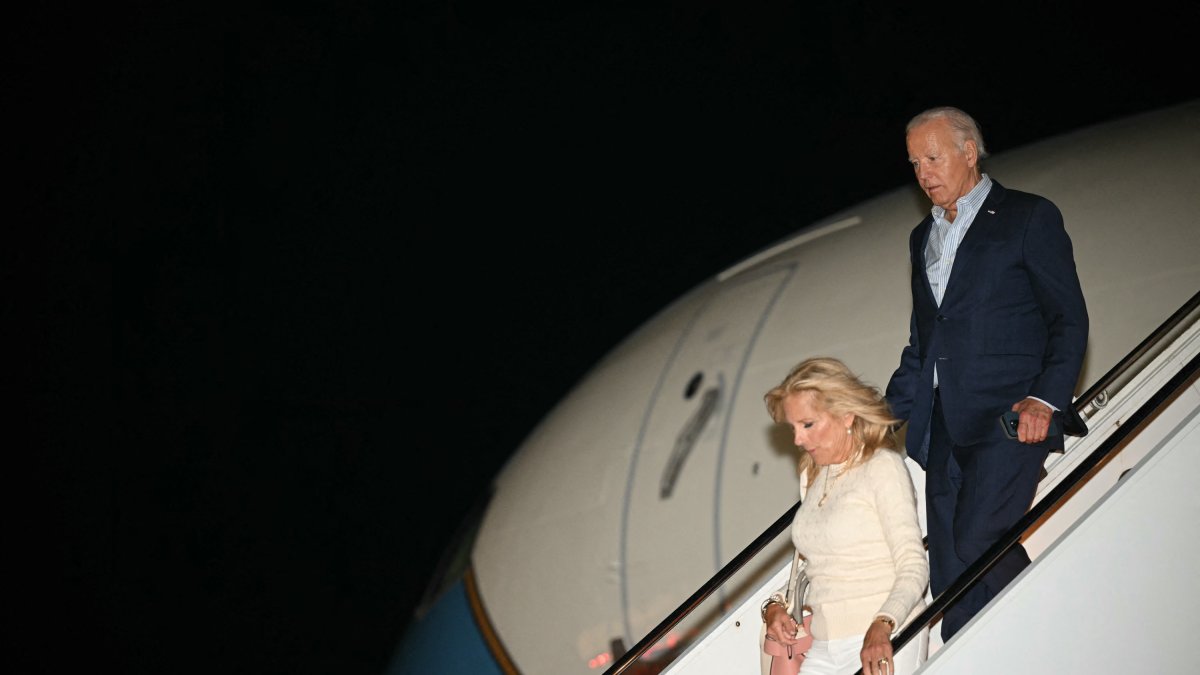Bidens campaign's frantic 48 hours to 'fix' disastrous Atlanta debate
The president's team had to calm down Democratic lawmakers, donors and also journalists who are pushing or weighing the possibility of a withdrawal of candidacy.

Joe Biden and first lady Jill Biden arrive at Hagerstown Regional Airport in Hagerstown, Md.
The last few hours have been absolutely frantic for the Biden campaign.
Following the debate in Atlanta, Georgia, the president's team had to make countless calls with allies and organize a flurry of campaign events to control the damage generated by Biden's poor performance in the face of Donald Trump.
According to The New York Times, the first 48 hours were especially tough for the Biden campaign, whose officials began working during the early hours of Friday morning, just hours after the debate, amid intense criticism from progressive media against Biden.
"In the wee hours of Friday morning, not long after President Biden had walked off the stage from a disastrous debate, his campaign chair, Jen O’Malley Dillon, acknowledged in a series of private calls with prominent supporters that the night had gone poorly but urged them not to overreact," read the pages of the NYT.
Later the same day, top White House aides got on the phone, and Biden's chief of staff, Jeff Zients, held a call with Senate Democratic leader Chuck Schumer, who filled him in on the temperature and concerns among Democratic lawmakers about Biden's candidacy.
In the afternoon, the Biden campaign traded its weekly all-staff call for a virtual chat to organize damage-control strategy and "dispel" any doubts at campaign offices in Wilmington, Delaware, and beyond, the NYT explained.
The outlet explained that campaign officials had to “pressure and plead with anxious Democratic lawmakers, surrogates, activists and donors to stand by the president.”
In the midst of the calls, the campaign organized a total of seven events in four different states. One of them in South Carolina went especially viral and captured national headlines, with Biden acknowledging his poor debate performance, but trying to put the spotlight on Trump. He explained that he is still capable of telling "the truth" and recognizing the "right from the wrong."
Now Biden, exhausted from the marathon day, has taken a break with a family reunion at Camp David. The president arrived late Saturday and will be accompanied by first lady Jill Biden, as well as Biden's children and grandchildren. This mini-retreat will likely be where the final decision will be made on whether Biden will continue or decline his candidacy through the advice of his family, which is often essential in major decisions in his political career.
With all the uncertainty surrounding Biden and his career, for the moment the president has won the public endorsement of leading Democratic voices, such as former Presidents Barack Obama and Bill Clinton. Moreover, one of the most named surrogates, California Governor Gavin Newsom, came out in support of Biden on television networks calling for the withdrawal of the nomination.
I’ll leave the debate rating to the pundits, but here’s what I know: facts and history matter. Joe Biden has given us 3 years of solid leadership, steadying us after the pandemic, creating a record number of new jobs, making real progress solving the climate crisis, and launching…
— Bill Clinton (@BillClinton) June 28, 2024
Likewise, so far, no Democratic lawmaker has publicly broken with Biden. In fact, on the contrary, some even backed him by criticizing the national media that pushed for a declination of the candidacy.
fuck that pic.twitter.com/OlV7bk3aqM
— John Fetterman (@JohnFetterman) June 28, 2024
Regardless, the NYT detailed that the Biden campaign's massive effort to try to fix the debate demonstrates "the depths of the damage Mr. Biden did to his re-election campaign in a mere 90 minutes."
"His campaign has been criticized as insular and insistent, so the burst of activity signaled that the debate fallout had turned into a real crisis that spun those in his orbit into a frantic battle mode," the NYT stated.
The New York daily reported that some Democrats were "quietly" debating ways to run other candidates, but senior Biden officials said and tried to convince almost everyone that there is no viable alternative and that Democrats should focus on the "threat" posed by Trump.
According to the NYT, the top advisers were Jeff Zients, Bruce Reed, Anita Dunn and Steve Riccheti, who had to call a substantial list of congressional leaders, major donors and activists. These advisers promised that Biden would prove he can be forceful enough during the rest of the campaign.
While the NYT, whose editorial board called for Biden's resignation, reviewed that the darkest hours of the campaign are over, the president and his team have yet to take the biggest hit: the impact of the major national polls after the debate.
The campaign's feeling is that they can no longer do anything to stop Biden's performance from directly impacting the polls, giving Donald Trump more momentum.












